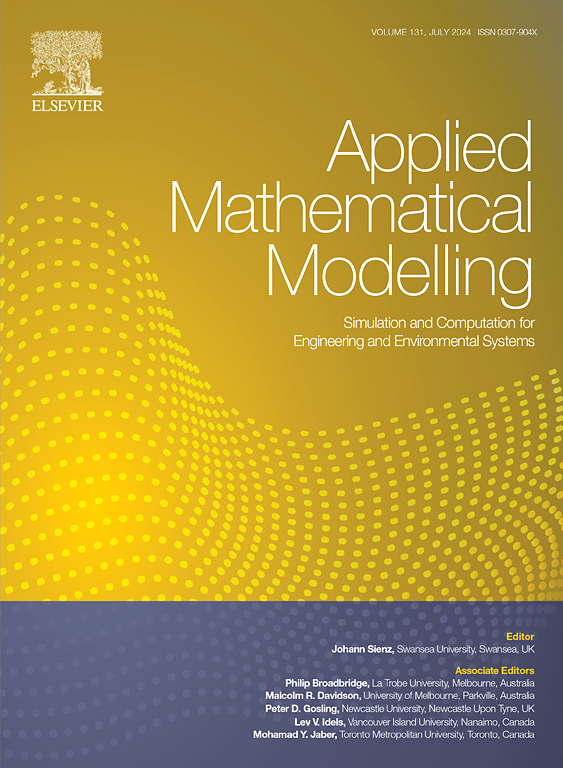Study of the interplay between cancer, inflammation, and immune disorders: A cellular automaton approach
IF 4.4
2区 工程技术
Q1 ENGINEERING, MULTIDISCIPLINARY
引用次数: 0
Abstract
Cancer is a complex disease influenced by immune system interactions and inflammatory processes. This study introduces a novel tumor-immune cellular automaton (CA) to explore the relationship between autoimmune diseases and cancer, the effects of immunosuppressive therapies on tumor growth, and potential treatment interactions in comorbid cases. Simulations reveal that autoimmune diseases can accelerate tumor progression, mainly when cancer cells exhibit high immune evasion and inflammatory responses. Conversely, our model suggests an overactive immune system may eliminate less aggressive tumors. Our simulations also showed that immunosuppressive treatments contributed to tumor growth. This fact aligns with clinical findings linking immunosuppression to higher cancer risk, highlighting the importance of personalized treatment strategies for immune dysfunction and comorbidities. Computational models like the one presented here provide a valuable framework for optimizing therapeutic approaches where cancer and immune disorders coexist.
癌症、炎症和免疫紊乱之间相互作用的研究:细胞自动机方法
癌症是一种受免疫系统相互作用和炎症过程影响的复杂疾病。本研究引入了一种新的肿瘤免疫细胞自动机(CA)来探索自身免疫性疾病与癌症之间的关系,免疫抑制疗法对肿瘤生长的影响,以及合并症病例中潜在的治疗相互作用。模拟表明,自身免疫性疾病可以加速肿瘤进展,主要是当癌细胞表现出高免疫逃避和炎症反应时。相反,我们的模型表明,过度活跃的免疫系统可能会消除侵袭性较低的肿瘤。我们的模拟还显示免疫抑制治疗有助于肿瘤生长。这一事实与临床研究结果一致,将免疫抑制与更高的癌症风险联系起来,强调了针对免疫功能障碍和合并症的个性化治疗策略的重要性。像这里展示的计算模型为优化癌症和免疫疾病共存的治疗方法提供了一个有价值的框架。
本文章由计算机程序翻译,如有差异,请以英文原文为准。
求助全文
约1分钟内获得全文
求助全文
来源期刊

Applied Mathematical Modelling
数学-工程:综合
CiteScore
9.80
自引率
8.00%
发文量
508
审稿时长
43 days
期刊介绍:
Applied Mathematical Modelling focuses on research related to the mathematical modelling of engineering and environmental processes, manufacturing, and industrial systems. A significant emerging area of research activity involves multiphysics processes, and contributions in this area are particularly encouraged.
This influential publication covers a wide spectrum of subjects including heat transfer, fluid mechanics, CFD, and transport phenomena; solid mechanics and mechanics of metals; electromagnets and MHD; reliability modelling and system optimization; finite volume, finite element, and boundary element procedures; modelling of inventory, industrial, manufacturing and logistics systems for viable decision making; civil engineering systems and structures; mineral and energy resources; relevant software engineering issues associated with CAD and CAE; and materials and metallurgical engineering.
Applied Mathematical Modelling is primarily interested in papers developing increased insights into real-world problems through novel mathematical modelling, novel applications or a combination of these. Papers employing existing numerical techniques must demonstrate sufficient novelty in the solution of practical problems. Papers on fuzzy logic in decision-making or purely financial mathematics are normally not considered. Research on fractional differential equations, bifurcation, and numerical methods needs to include practical examples. Population dynamics must solve realistic scenarios. Papers in the area of logistics and business modelling should demonstrate meaningful managerial insight. Submissions with no real-world application will not be considered.
 求助内容:
求助内容: 应助结果提醒方式:
应助结果提醒方式:


